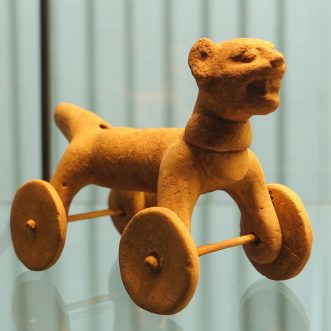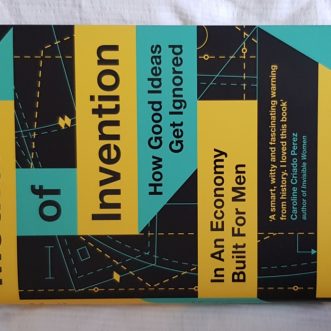
The Emperor’s new clothes
When is a market not a market?
When the companies behind every ‘brand’, turn out to be the same one, two or few.
Prepare to feel the cold.

When is a market not a market?
When the companies behind every ‘brand’, turn out to be the same one, two or few.
Prepare to feel the cold.

Before the European invasion, the only use the people of the Americas had for wheels, was for pull-along toys. They used headstraps and pack-animals for carrying things, and made their clay pots by hand-building. Messages were carried by runners.
Perhaps because there were no suitable native draught animals, or because the terrain was too difficult, the possibilities of the wheel were seen, but never applied, except in play. Until of course, the Spanish introduced horses and cattle.
We tend to think of innovation as the creation of new things by a single individual. Actually, much innovation arises from joining the dots. And that only happens once the dots are in place.
Where are the dots being created in your industry? Could you join them to create something new?

I love my cat. She doesn’t love me back.
All she’s really interested in is food and sleep. And every now and then, a bit of attention – on her terms, when and where she wants it, never when I do. She’s lazy, greedy and selfish. She is ‘Cattus Economicus’.
She can’t help it, cats, like most mammals, have evolved that way.
But not us humans. Somewhere in our distant past, we evolved new instincts of collaboration, co-operation, altruism. Because we needed those traits to survive.
‘Homo Economicus’ is a convenient fiction, that tells us more about the economists and politicians who use it than the people they like to apply it to. In their eyes, you and I and most of the people we know are less than human, to be treated is if all we care about is food and sleep.
We know better. We know that we collaborate, co-operate and help each other out all the time. We know that we need to exercise these pro-social instincts more than ever if we are to solve the pressing problems our species faces.
“Never doubt that a small group of thoughtful, committed citizens can change the world; indeed, it’s the only thing that ever has.” Margaret Mead.
We’re no pussycats.

This is my 700th blog post. The idea of writing it was a little daunting, I have to say, although … Read More “700”

Decades ago, I rescued my mother from a tiny rock, in a shallow sea. No big deal you might think, but she had poor eyesight, vertigo, and couldn’t swim. She was used to staying on the sand. She was panicking, hiding it because she’s our mum, and supposed to be in charge.
I might have been tempted to shout from my place halfway up the beach: “Just step in, it’s not deep, you’ll be fine!”
But I didn’t. I paddled out to her, took her by the hand, and helped her to put one foot down and the water and see just how shallow it was. I got her to put her next foot down, letting her lean on me until she felt steady on her feet.
Then I let her walk by herself the rest of the way.
When what you offer is new, it is also scary. It doesn’t matter that you know the rock is tiny and the sea is shallow. Your prospect doesn’t know that, not emotionally, where it matters.
Don’t just shout from a distance, move to where they are, accompany them on the first steps of their journey. Then let them move forward with dignity.
They’ll remember that for the rest of their life.

Starting from where they are isn’t only for prospects.
Your team will appreciate this treatment too.

Middlemarch is my favourite work of fiction precisely because George Eliot (Mary Ann Evans) succeeds so well in this endeavour.
Not everyone in the book is good, or beautiful, or admirable or likeable, but by the end you feel they are all worthy of the investment of your attention. Even the ‘villains’. You may not approve of everything they do, but you at least understand how they got there. Not through being ‘good’ or ‘evil’, but through being human, by the choices they take at each little fork in the road, how they justify those choices to themselves and how that leads to the route taken at the next fork, and the next.
Reading fiction is one of the most effective ways I know to expand my horizons. I’ve ‘met’ far more people through fiction than I could ever hope to meet in the flesh, from all sorts of backgrounds, times and places. Practising empathy for these characters, written by and about people outside my comfort zone is great practice towards doing it for real.
I know quite a few businesses who keep a library of business books for their team. Perhaps its time to add some fiction.

Management – the co-ordination of activities executed by many people – is expensive. Managers don’t contribute directly to the bottom line, and good managers cost good money to hire. So it’s no surprise that firms around the world have been looking for a way to get rid of managers.
One solution is to automate – management by algorithm, as used by Uber, deliveroo and the like, and increasingly applied to fields such as home-care. This is hideously expensive to set up, of course, and it depends on creating an effective monopoly. Plus it effectively turns humans into mindless robots, paid accordingly.
The other solution is to devolve responsibility out and down to the front-line – radical de-centralisation, where teams on the front line manage themselves. An extreme (and very successful) example of this is Haier Industries, essentially what Corporate Rebels call ‘the biggest startup factory in the world’.
At Haier, ‘teams’ are startups, consisting of internal and external people (such as suppliers), all working to create value for customers, sharing the risks and the rewards along the way. They are monitored and supported, but not controlled. Haier doesn’t decide what will work and what won’t, the market does.
In contrast to Uber and the like, Haier has created a highly profitable solution to getting rid of managers – by creating an ecosystem that enables self-managing people to do what only humans can do – create value for other humans – supported and rewarded by systems that help them to keep growing.
In the future, there will be no managers, only management. What kind of management do you want for your business? Uber? or Haier?
I know which I’d prefer.

I received this book on Friday and finished it on Saturday. It is, as one (female) reviewer put it “equal parts informative and infuriating”, what I call ‘a gnasher’ – where men decide that woman ‘can’t do’ something because of their biology, then make a law to prevent them doing it anyway, just in case.
Gnashing aside, this is well worth a read, if only to help us think about what the world could look like if businesses founded by women received more than 1% of UK venture capital, or if ideas that come from the old, the differently-abled or the ‘lower classes’ were taken seriously.
If ‘innovation’ wasn’t just about disruption, creative destruction and domination, but also about care, repair and contribution.
Or if we just acknowledged that we’re human animals, with bodies as well as brains.
I recommend it.
We need more mothers of invention.

When you’re stuck, questions can be more helpful than answers.
As I found at Like Hearted Leaders this morning.
Why not give them a try?